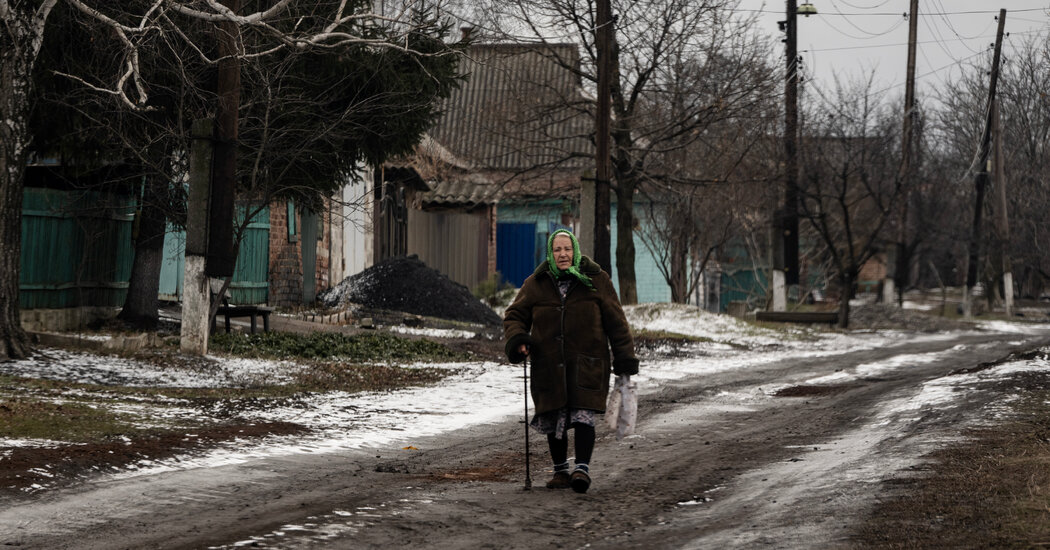Villagers living near the Ukrainian city of Avdiivka listened with dread in recent weeks to the sound of the bombs falling there, knowing their troops were taking a pounding and their villages were next in line.
Now the chances of bombs landing on them are growing by the day. Russian troops captured Avdiivka 12 days ago and the front line has shifted westward, threatening the next Ukrainian farms and villages that lie in their path.
“It is very tense right now,” said Oleksandr Kobets, a farmer who was butchering a pig in his yard. “You wake up several times a night. They are coming closer and closer.”
The loss of the eastern city of Avdiivka has been a blow for Ukraine, coming amid declining Western support and a shortage of weaponry that left its outnumbered soldiers also outgunned. But for the farmers and miners and their families who live in this nearby stretch of towns and villages, Russia’s sudden advance is upending already hard lives, leaving them poised to flee.
“We are sitting on our suitcases,” Mr. Kobets said.
Life in this province, Donetsk, has been disrupted by almost a decade of war and many families have fled the region because of poverty and joblessness as much as from the conflict. But so long as Ukraine’s defenses held for the most part around Avdiivka, many farmers and pensioners hung on, since it was cheaper to live in their own homes than pay rent in a city, and they could live off the land.
After Avdiivka was lost, Ukrainian soldiers fell back to positions in villages abutting the city, but they have lost three more villages in heavy fighting in the last few days. The sound of heavy artillery exploding is a constant background to life in the villages beyond.
On Thursday, the commander in chief of the Ukrainian Army, Gen. Oleksandr Syrsky, said in a post on his Telegram channel that some commanders had miscalculated in planning for the latest Russian advance, but he did not provide details.
As they get ready to again face the Russians, Ukrainian soldiers have been resting up in empty houses or with families throughout the parts of the Donetsk region that remain under Ukrainian control, finding local helpers to wash and stitch their uniforms while they fix their cars and stock up on supplies.
Those who were shopping in a village store seemed deeply weary. The bombing in Avdiivka was the worst they had ever seen, one soldier called Oleh said. Almost everyone was suffering from concussions, he added. He gave only his first name according to military protocol.
The villagers seemed unperturbed that the presence of soldiers could bring Russian strikes upon them. Local men were also fighting at the front and some had gone missing in action in previous battles, said Tetyana Rud, the head of the council overseeing two villages near Avdiivka.
“I think the soldiers who pulled back are consolidating positions,” she said. For now, the 389 civilians in her two villages were staying put, she said. There had been artillery strikes on a farm and other targets in the area, but so far both villages had escaped direct damage.
Yet everyone was packed and prepared to leave on short notice, she said.
“If the soldiers leave, we will leave as well,” she said. “If the soldiers say we should go, we will go.”
She sat in a village council building with a group of women volunteers. “This is my support group,” she said. “We are full of energy, and optimism, and spirit.” The women helped manage the distribution of boxes of humanitarian aid that were stacked in a supply room, and they run a small first-aid post in an adjoining room.
One of the women, Yulia, 62, said she would not leave. Her pension amounted to less than $80 a month, and she felt she would not be able to manage away from home.
“I will not go anywhere,” she said. “And I don’t want to live in a dormitory.”
“Don’t fool around,” Ms. Rud replied. “We will take you with us.”
“If my house falls on me I will be buried under it,” Yulia insisted, leading Ms. Rud to say, “We will tie her up and evacuate her.”
They all had prepared their cellars as bomb shelters, and the children had taken part in drills to run and take cover, she added. Everyone had a grab bag with their documents at hand, too.
“It’s tough,” Ms. Rud said, “but we try not to lose our spirit because the whole village looks to me.”
But other villagers were gloomy about the approaching Russian onslaught.
“We are all scared,” said Kateryna Lytvynova, 73, who lost her husband a few years ago and spent a month in the hospital last year after suffering a stroke.
“We do not want the Russians,” she said. “We don’t want any outsiders, even if we become worse off, we don’t want them.”
She has hung blankets over her doors and windows to block any light showing from her house at night. The whole village goes dark after 7 p.m. she said. “Even the soldiers use small candles,” she said.
She sits alone in the dark beside a religious icon propped up on a table in the corner of her sitting room, listening to the explosions.
“At a quarter to midnight there was a big explosion, another time at 10 p.m.,” she said. “A week ago a big farm was shelled and the pigs are still running around.”
“I sit and pray in the dark,” she said. “Everything would be fine if it was silent.”
The farmer, Mr. Kobets, said he doubted the Ukrainian Army could stop the Russian advance, and he expected to lose his farm. “I am preparing myself psychologically to go,” he said.
He did not have anywhere to go to, though, nor did he have the money to rent a truck to move his livestock and belongings.
“A Ukrainian farmer is a poor person,” he said. As for the farm, he fully expected the Russians to loot what was not razed.
“I think it will all be destroyed,” he said, gesturing at the farm buildings around him. “One hundred percent.”



